Toronto—In a startling revelation at the Canada-U.S. Economic Summit, outgoing Prime Minister Justin Trudeau cautioned that former President Donald Trump’s musings about annexing Canada should not be dismissed as a joke. Speaking behind closed doors, Trudeau stated that Trump’s fixation on making Canada the “51st state” is “a real thing,” driven by economic and geopolitical interests.
His remarks, partially caught by a live microphone and later reported by multiple Canadian media outlets, highlight growing concerns among policymakers about the future of Canada-U.S. relations, especially as Trump prepares for a potential return to the White House.
Trump’s Annexation Rhetoric: From Joke to Political Strategy?
Trump’s comments about absorbing Canada into the United States date back to a private dinner with Trudeau in December. At the time, Canadian officials brushed off the remarks as lighthearted banter. However, Trump has since repeatedly brought up the idea, framing it as a solution to trade disputes and a means of securing access to Canada’s critical mineral resources.
During a recent Oval Office press briefing, Trump was asked what concessions Canada could offer to avoid the proposed 25% tariffs on all exports, excluding energy. His response was blunt: “What I’d like to see—Canada become our 51st state.” He later reinforced the idea on his Truth Social platform, where he referred to Trudeau as “Governor Trudeau,” implying a diminished status for the Canadian leader.
While some analysts believe Trump is simply playing hardball in trade negotiations, others warn that his repeated mentions of annexation signal a strategic effort to reshape North American economic dynamics.
Economic and Political Fallout: Tariff Threats and Market Anxiety
Trump’s proposal to impose hefty tariffs on Canadian exports—except for energy, which would be taxed at 10%—has triggered widespread anxiety across Canada. With nearly 75% of Canadian exports destined for the U.S., such tariffs could devastate industries and lead to significant job losses.
In response, some provincial leaders have launched “buy local” campaigns, urging Canadians to prioritize domestic goods and reduce economic dependence on the U.S. Others, including Energy Minister Jonathan Wilkinson, have advocated for strengthening cross-border trade agreements in critical sectors such as energy and minerals to mitigate potential damage.
Trudeau, acknowledging the mounting economic uncertainty, urged Canadian business leaders at the summit to develop long-term strategies to protect national interests. “We are facing a more challenging, long-term political situation with the United States,” he warned, emphasizing the need for resilience in trade and economic policies.
Canadian Public and Political Leaders Push Back
Trudeau is not the only official dismissing Trump’s proposal. Transport and Internal Trade Minister Anita Anand delivered a firm response, stating, “There will be no messing with the 49th parallel,” in reference to the U.S.-Canada border.
Public sentiment strongly opposes annexation, with an Ipsos poll conducted in January revealing that 80% of Canadians would vote against any attempt to merge with the U.S. The idea of statehood would also require approval from both chambers of the U.S. Congress, including a supermajority vote in the Senate—a near-impossible hurdle given the deep political divisions in Washington.
Despite this, Trump’s rhetoric has unsettled Canadians, fueling debates about sovereignty and national security. Former U.S. presidential adviser Steve Bannon recently suggested that increased economic and military integration between Canada and the U.S. is inevitable, hinting at long-term geopolitical pressures that could push Canada closer to its southern neighbor.
Trudeau Preparing for an Uncertain Future: Canada’s Strategic Response
With only a month left in office, Trudeau has urged Canadian leaders to seize this moment as an opportunity to tackle long-standing economic and policy challenges. He stressed the need to eliminate internal trade barriers, streamline regulations, and bolster Canadian industries to reduce reliance on U.S. markets.
At the summit, Trudeau’s call to action resonated with attendees, who recognized the urgency of reinforcing Canada’s economic independence. Some experts have proposed forming stronger alliances with the European Union and Asia to diversify trade partnerships. Others suggest Canada should invest more in domestic production of critical resources to lessen U.S. leverage over the country.
As Trump’s annexation rhetoric continues to make headlines, Canada finds itself at a crossroads. Whether his words are mere political posturing or a glimpse into a larger strategy, one thing is clear—Canadian leaders are no longer laughing.














